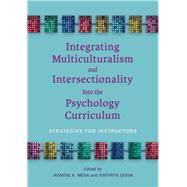Chapters examine specific sociocultural groups based on gender, ethnicity, religious beliefs, sexual orientation, and socioeconomic and ability status. Authors discuss these topics using an intersectional approach, recognizing that individuals are complex beings who are members of multiple groups and whose overlapping identities influence their development, social relationships, and worldviews. Other chapters offer recommendations for integrating multiculturalism into core psychology courses, including introduction to psychology classes, which are most undergraduate students’ only exposure to psychology.








